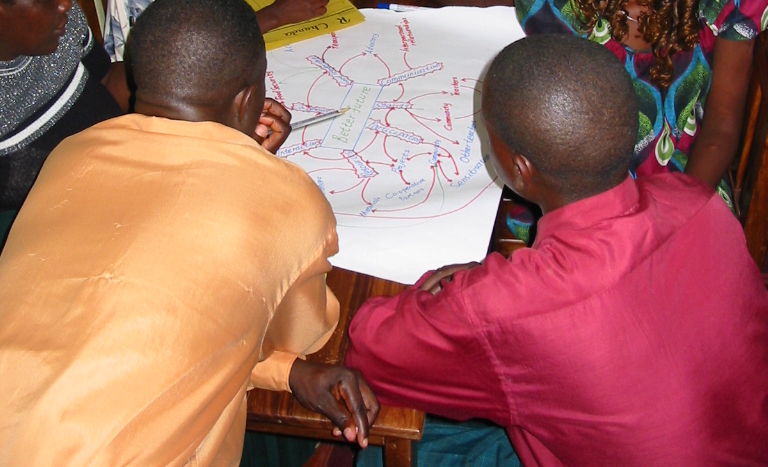A blog by: Ingrid Lewis, Managing Director, EENET.
Training teachers to be inclusive is a growing industry. NGOs, UN agencies, governments and consultancy businesses around the world are involved. The majority of work so far focuses on in-service training – aiming to bring new ideas and skills to existing teachers. Happily, there is also growing recognition of the need to embed inclusive education into all pre-service training.
I want to look at in-service training here. There are many angles to discuss this from – so watch out for more blogs! But for now, I want to look at the issue of how teachers are perceived. I believe this is negatively affecting how inclusive education training is designed and implemented.
A teacher’s life
In the countries where EENET and our network and consultancy partners work (e.g. across Africa, Asia, Middle East, Latin America) teachers do not have an easy time. Often they have received quite limited pre-service training – in terms of both the quality and length of training. There may be few support options for them: no one to help them continue learning, especially in their early career, or to give advice if they have a problem. Add to this the numerous resource and practical challenges of working in under-funded schools and education systems: poor infrastructure, not enough equipment and materials, long and difficult journeys to work, over-crowded classes, low pay and often late pay, poorly developed curricula and exam systems. The list goes on.
With all this as the backdrop, along comes a project that wants to train teachers in target schools to be inclusive, so they can enrol, welcome and support a more diverse range of learners. The teachers take a deep breath and tentatively say “Ok, if you insist”.

Sky-high expectations
Then what happens? Well, often the teachers sit through a one-off, short (e.g. 5-day) and theoretical training course on inclusive education, or sometimes just disability awareness. The project then expects them to convert the theory into practical change in the classroom and school. Sometimes they are expected, within a year, to show substantial changes to either enrolment data or learning outcomes, or both. Sometimes other activities help towards this change – like practical disability-oriented support from a community-based rehabilitation project, community awareness-raising, or infrastructure improvements – but not always.
So, let’s think about this. Basically, we are expecting these teachers to be some of the world’s fastest and most effective learners; able to take a rapid and superficial introduction to inclusion, instantly internalise and analyse what that means in their own classroom, devise lots of new ways of working from thin air, and then implement them… within the very tight timeframe set by a donor they have never met.
I’m not belittling the capacity of teachers – there are some incredibly talented teachers out there, as well as some who struggle – but this is a massively unrealistic expectation for most teachers in the countries EENET focuses on. It is especially challenging for those who had a minimal education themselves or who are working in particularly difficult circumstances.
Software update installation failed!
Don’t get me wrong, I want to see a world in which every teacher has been well-trained on inclusion issues, from day one of their basic training and throughout their service. I’m definitely not trying to find a way to help teachers avoid further training. But I think we need to look more carefully at who teachers are before we can get the approach right.
Teachers are learners – adult learners. However, in-service teachers are not just being asked to learn something new when they participate in inclusive education training. That would be difficult enough, but in reality they are also being asked to rethink everything they were taught in their pre-service training; re-assess everything they have experienced since they started their careers; and indeed re-assess everything they experienced as a learner in their own school days. That’s pretty mind-blowing stuff if it’s all crammed into 5 days!
Like any learner of any age, teachers possess a combination of learning strengths and weaknesses. Further, some absorb new ideas or embrace change with enthusiasm, others struggle to take on board new concepts or find change very unsettling. We know that many young learners ‘learn through doing’ (touching, manipulating, experimenting, practising) rather than just by being told something or reading about it. Adult learners are often even more likely to learn though doing. Their life experiences have honed their practical skills. It may be a long time since they had to learn through listening to a lecture or reading text books. Some may feel they don’t have the time, interest or confidence for that sort of ‘back to school’ approach to learning now. Yet most inclusive education training is workshop or lecture-based and theoretical, not practical.
In short, many of the inclusive education training courses I have observed, read about or evaluated fail to recognise that teachers are adult learners. The courses seem based on an assumption that teachers are machines who can be reprogrammed overnight with a one-off software update!

Find the learners within teachers
Here is a summary of things to think about, to ensure we reposition teachers as professional adult learners within inclusive education rather than as programmable machines:
——————————————-
Give teachers opportunities to learn in different ways, not just in rushed workshops. Everyone has different preferred ways of learning.
Give teachers plenty of time for learning and plenty of time between trainings. They are busy and stressed – allow the learning to fit in with the other pressures of daily life. Recognise teachers’ life challenges and ensure trainings do not make life more difficult personally.
Respect teachers as mature adult learners and enable them to take more decisions about and responsibility for their own learning. Ask them what they want to learn, how they want to learn, and when they want to learn.
Ensure all inclusive education training is weighted towards practice-based learning. Most adults also are used to learning by solving life’s problems, so ensure trainings use activities that encourage problem-solving, analysis and critical thinking.
Acknowledge the full range of teachers’ life experiences and transferable skills and bring these into trainings. This makes teachers feel more valued as experienced professionals and also makes the training more relevant.
Adult learners want to know why they are learning and what they are aiming for, so make sure training activities are clearly explained with realistic goals for the teachers.
Provide plenty of ongoing learning support so that teachers feel confident that even if they didn’t understand something fully during a workshop or practical session there will be more opportunities for them to discuss and learn about that issue later.
Develop peer learning and support mechanisms for teachers. Adult learners often learn best through collaborative approaches or from colleagues rather than outsiders.
Use action research between trainings to enable teachers to work together, and with non-teaching staff and other stakeholders such as other professionals and community members, to learn about and find solutions to inclusion challenges.
Find ways to motivate teachers to learn. Adults learners are motivated by different interests and desires – to do their job better, to improve their career or pay options, to contribute to social change, to prove to themselves or others that they can do something different/new. The motivation of expectation from one’s boss or from an ‘external power’ is not always enough!
——————————————-
Teaching can be a tough profession at the best of times. Teachers experience daily challenges that many of us would find impossible to cope with. They want to do a good job. They want their students to learn and have successful lives. The majority also want to help marginalised and excluded learners get a good education – but teachers themselves need the right education and support in order to do this. Quick-fix options like short, one-off workshops do not help the teacher to be an effective learner, but unless we develop a workforce of teachers who are effective adult learners, we will continue to struggle with implementing inclusive education.
Send us your thoughts, ideas and experiences on the issue of teacher education for inclusion, or leave a comment in the box below.